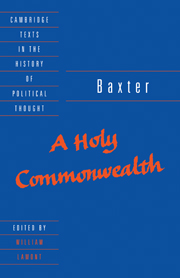Book contents
- Frontmatter
- Contents
- Preface
- Introduction
- Richard Baxter: a chronology
- Further reading
- Biographical notes
- A Holy Commonwealth
- Preface
- An Addition to the Preface
- Adam Contzen the Jesuites Directions
- 1 There is a God that is mans Creator
- 2 God is the Soveraign Ruler of Mankind
- 3 Of the Constitution of Gods Kingdome
- 4 Of the Administration of the Universal Kingdom
- 5 Of a subordinate Commonwealth in General
- 6 Of the several sorts of Commonwealths
- 7 Of the Foundation efficient and conveying causes of Power
- 8 Of the best form of Government, and Happyest Common-wealth
- 9 How a Commonwealth may be reduced to this Theocratical temper, if it have advantages, and the Rulers and People are willing
- 10 Of the Soveraigns Power over the Pastors of the Church, and of the difference of their Offices
- 11 Of the Soveraigns Prerogatives, and Power of Governing by Laws and Judgement
- 12 Of due Obedience to Rulers, and of Resistance
- 13 Of the late Warres Meditations
- Appendix: Preface to The Life of Faith (1670)
- Index
- Title in the Series
4 - Of the Administration of the Universal Kingdom
Published online by Cambridge University Press: 05 June 2012
- Frontmatter
- Contents
- Preface
- Introduction
- Richard Baxter: a chronology
- Further reading
- Biographical notes
- A Holy Commonwealth
- Preface
- An Addition to the Preface
- Adam Contzen the Jesuites Directions
- 1 There is a God that is mans Creator
- 2 God is the Soveraign Ruler of Mankind
- 3 Of the Constitution of Gods Kingdome
- 4 Of the Administration of the Universal Kingdom
- 5 Of a subordinate Commonwealth in General
- 6 Of the several sorts of Commonwealths
- 7 Of the Foundation efficient and conveying causes of Power
- 8 Of the best form of Government, and Happyest Common-wealth
- 9 How a Commonwealth may be reduced to this Theocratical temper, if it have advantages, and the Rulers and People are willing
- 10 Of the Soveraigns Power over the Pastors of the Church, and of the difference of their Offices
- 11 Of the Soveraigns Prerogatives, and Power of Governing by Laws and Judgement
- 12 Of due Obedience to Rulers, and of Resistance
- 13 Of the late Warres Meditations
- Appendix: Preface to The Life of Faith (1670)
- Index
- Title in the Series
Summary
Having spoken of the CONSTITUTION of the Kingdom of God, I shall proceed to speak of the ADMINISTRATION thereof.
Thes. 35. God as the Soveraign Ruler of mankind hath given him the Law of nature, commonly called the Morall Law, to be the Rule of his obedience.
1. The Law of nature in the primary most proper sence, is to be found in natura rerum, in the whole Creation that is objected to our Knowledg, as it is a Glass in which we may see the Lord, and much of his Will; and as it is a Signifler of that Will of God concerning our duty. 2. The Law of nature is sometime taken for that Disposition or Aptitude that there is in mans nature to the actual knowledg of these naturally revealed things, especially some clear and greatest Principles, which almost all the world discern. 3. And it is sometime taken for the Actual knowledge of those plain and common Principles. 4. And sometime for the Actual knowledge of all that meer Nature doth reveal. When I say God hath given man this law of nature, I mean, both that he hath made an Impress of his minde upon the Creation, and set us this Glass to see himself, and much of our Duty in, & also that he hath given to the very nature of man a Capacity of perceiving what is thus revealed, and a disposition especially to the Reception of the more obvious Principles; so that by ordinary helps, they will be quickly known; and the rest may be known if we be not wanting to our selves.
- Type
- Chapter
- Information
- Baxter: A Holy Commonwealth , pp. 62 - 67Publisher: Cambridge University PressPrint publication year: 1994

